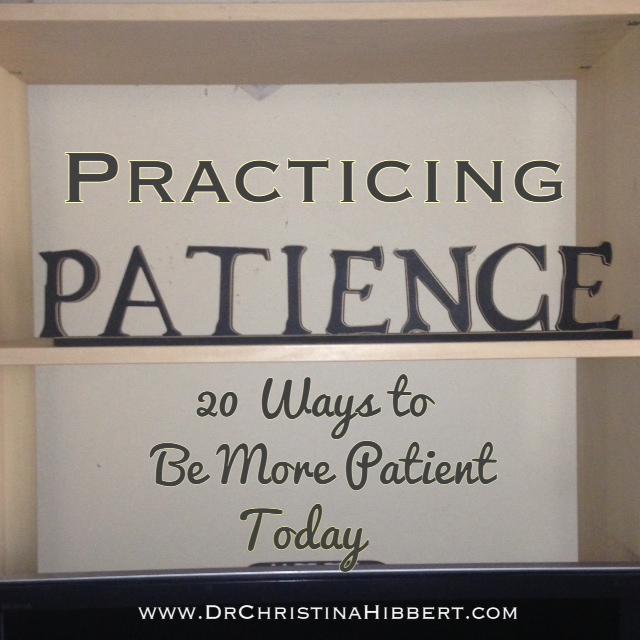
15 Oct Practicing Patience: 20 Ways to Be More Patient Today
“Patience is a virtue,” it’s been said, and certainly it’s true. When we live with patience, we experience greater peace, joy, and love. We notice and embrace the beautiful parts of life and endure gracefully the hard parts. As we practice patience, we help our families and communities experience greater peace, joy, and love too.
I spent an entire year practicing patience on purpose. It was my theme for 2007, and it was also the year when my life fell to pieces. I began the year knowing I needed more patience—with my kids, my husband, and especially myself. But then, life threw me for a loop, and I needed patience all the more. During my year of Patience I learned several strategies that helped me become a far more patient person (many of which I share in my memoir, This is How We Grow, coming Nov. 13th!).

I had this “patience” sign made during my year of patience and put it in the basement, where my boys live. Every time I go down and see their messes and craziness, I’m reminded to practice patience. Totally works!
If there’s one thing I know about patience, it is this: We can all increase in patience, if we work on it. Like any skill, patience must be practiced. And, like any skill, it helps to have some simple ideas to show us how to improve.
Below are “20 ways to be more patient today.” The first eight come straight from my year of Patience; in fact, they’re the chapter titles for the first eight chapters of my book’s Part 1: Patience. Patience also happens to be the theme for lesson two of my This is How We Grow Personal Growth Group (for information, click here), which inspired me to add the other twelve ideas. I hope all 20 ways to be more patient will inspire you to practice patience today. Not tomorrow. Not next month. Choose one or two, and be a little more patient today.
1) Choose to grow. It’s much easier to be patient when you see the greater design of things. Frustrating moments, people, and situations can all teach us something, if we choose to learn the lesson. If we choose to grow.
2) Live strong. Life is hard. But we can do hard things. Don’t ever forget it.
3) Appreciate life. Look for all the great things that are in front of you right now. Never take for granted your loved ones, the beauty of the world, and the moments that make life worthwhile, and you will definitely become more patient.
4) Accept what is. You don’t have to like what is or even agree with it; you just have to accept it. In accepting what is, we stop fighting with ourselves over things. We can breathe, take a good long look and see, “This is what is happening right now.” And that is patience.
5) Live in the paradox. If you don’t have clarity, or if things seem to be paradoxical or confusing, go ahead and live in the paradox for a while. Give yourself time for things to work themselves out instead of impatiently forcing an outcome.
6) Ask “How.” Don’t get stuck in the “why’s” of life. “Why is this happening to me?” “Why can’t I just be good at this?” Instead, ask “how.” “How do I carry on?” “How do I do what I’m being asked to do?” “How” is the question of patience.
7) Fake It ‘til you Make It. One of the best ways to practice patience is to act as if for a while. Act as if this thing didn’t bother you, or as if you know what you’re doing. I’m not saying you should be fake; no, I am definitely all for authenticity and being real. But, faking it for a while is a great way to get through the tough moments with patience.
8) Slow Down and See. Life is so busy, and it can be a huge cause of impatience. Slowing down allows us to see and appreciate the richness of life. I wrote a really great article about this, so check it out.
9) Get enough sleep. When we’re too tired, we don’t cope well. Period. Get your 7-9 hours per night and take naps as needed to refresh you and give you a boost in patience.
10) Practice deep breathing and/or meditation. Practicing deep breathing every day helps it become a habit. And taking a few deep breaths when stress comes our way can hugely affect our level of patience. Meditation is also a wonderful practice, taking us out of of thinking mind and into our soul. Here are two thirty-second videos that show you how to start practicing deep breathing and meditation.
11) Look for the love. If we want to be patient, it helps to understand why. It’s really about love. Loving ourselves and our growth to be the best we can be, and of course, loving others. When you’re about to lose your patience, especially with your kids, partner, or other loved one, stop and remember the love.
12) Write it out. Writing is one of the greatest tools for personal growth, for it helps us get things out of our head and onto paper, where we can go back and examine it. Writing helps us see what’s really going on and helps us gain perspective to increase our patience.
13) Use a thought record to try to understand things better. Understanding the connection between your thoguhts, feelings, body, and behavior, is powerful, for it helps you identify thoughts that hold you back. A thought record can help you tease feelings and thoughts apart and give you the opportunity to challenge and change unhealthy thoughts, creating more patience. This post and video can show you how.
14) Learn about the spiral of change. If you’re impatient about making change, understanding this model can be hugely helpful. There’s a lot more to making change than meets the eye, and usually, we’re making more progress than we believe.
15) Be kind to yourself. If you’re impatient with yourself over your faults, focus on self-love. Do something nice for yourself, recognize your strengths, and embrace your weaknesses as areas in which you can grow. Here are some ideas from my post, 5 Tricks for Treating Yourself More Kindly.
16) Take a time-out. This is great for parents. We give our kids a time-out when they need to settle down, and it works just as well for adults. It’s also great when we’re feeling frustrated with a project or person. Taking time to let our bodies calm down can increase our brain power, mental clarity, and understanding, leading to greater patience.
17) Remember you can’t have all the answers all the time. It’s the questions that matter most anyway. As poet Rainer Maria Rilke once said, “”Be patient toward all that is unresolved in your heart and try to love the questions themselves. Do not now seek the answers, which cannot be given you because you would not be able to live them. And the point is to live everything. Live the questions.”
18) Recognize the power of your body and hormones. Some days are just going to feel harder than others, and your patience will suffer more. Understanding how hormones and other factors, like sleep, exercise, and substance use affect your ability to think and feel healthy is an important part of being patient with yourself. On the hard days, give yourself a break, knowing it will soon pass if you take care of your body’s needs.
19) Acknowledge your Higher Power. Recognize that we cannot see the bigger picture, but God can. He knows what we need and don’t need and will never lead us astray. Putting our trust and faith in the great Divine, praying, seeking guidance and answers, and listening as they come is the key to lasting patience.
20) Let go. Let go of the need to know it all now. Let go of the need to be perfect. Let go of the desire to control your life or relationships. Let go of all you cannot understand. Let yourself trust that all will be well, and patiently, let go.
Join my This is How We Grow Personal Growth Group!
Free. Online. Choose to grow with us today!
Registration and information here.
SUBSCRIBE, below, for updates and giveaways for my new book,
A psychologist’s memoir of loss, motherhood
and discovering personal growth and joy,
one season at a time.
[author] [author_image timthumb=’on’]http://www.drchristinahibbert.com/wp-content/uploads/2012/03/square-head-shot1.jpg[/author_image] [author_info]Clinical Psychologist, Mom of 6, Postpartum Couples DVD Producer, Non-Profit Founder, and expert on Parenting, Women’s Emotions, Pregnancy & Postpartum, and Grief & Loss, Dr. Christina Hibbert loves songwriting, learning, and teaching what she learns. She continues to practice patience every day, especially when she’s too tired and her kids won’t let her get a nap![/author_info] [/author]
What helps you be more patient? Share your ideas with us in the comments, below!
Don’t miss a thing! SUBSCRIBE, below, and please “Like” my Facebook page and follow me on Pinterest, Twitter, or Instagram for inspiration and discussion on the topics that matter to you!
[subscribe2]
Related Posts/Articles:
This is How We Grow: Understanding the Seasons of Personal Growth
How to Embrace Strengths & Weaknesses
Stress Management: 15 Proven Ways to Stress Less (& Smile More!)
Slow Down and See: How to Appreciate Life’s Richness
Achieving Balance: Why You’ve Got it Wrong, and How to Get it Right
“Mommy Fails”: 3 Messages Every Mom Needs to Hear
Personal Growth & Self-Actualization
The Value of Authenticity: 5 Ways to “Get Real!”
16 Things I’d Like My Postpartum Self to Know, 6 Kids and 16 Years Later
In Memory of My Sister, on the 5th Anniversary of Her Death
Women’s Emotions, Part 1: The 3 Components of Emotional Health
Parenting Skills: Getting good at the “Let-Go’s”
Thought Management, Part 1: The Link Between Thoughts, Feelings, the Body, and Behavior
The Key to Worry-Free: The Worry Tree
“Fake it ‘Til You Make it”: A Surefire Way to Prevent a Meltdown
“Sleep Better, Cope Better”: 6 Insomnia Causes and Cures
5 Steps to a Clutter-Free Mind (& Life!)
Weather the Storms Together: 4 Ways to Strengthen Families Through Times of Stress
10 Benefits of Practicing Gratitude


Patience for me lately has centered around me re-reading the test questions so that I can better understand how to pass the NCE. Yes, this has become a beast, but I am putting up my boxing gloves and ready to pass it. So patience means taking the time to know your study habits, know yourself, your strength and weaknesses and push through it by saying positive things to yourself so that you can concur that beast.
Absolutely! Thank you so much, Annmarie. Patience is definitely knowing how you work best and playing to your strengths. Good luck with your test!!